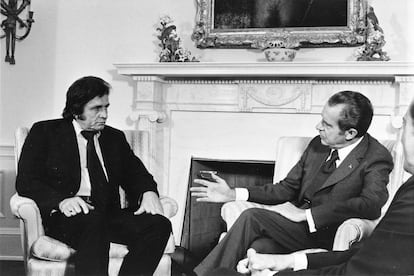Johnny Cash’s truth vs. a president’s lies
Netflix documentary Nixon and the Man in Black chronicles Nixon’s failed attempt at using the singer to curry favor with voters

Country music legend Johnny Cash had never worn tails before President Richard Nixon invited him to perform at the White House on April 17, 1970, the same day the Apollo 13 astronauts were rescued. Besieged by Vietnam War protests, Nixon thought that Cash could help him with southern voters, a key bloc for the Republican Party then and now. The singer came from a rural, conservative and religious background. He also supported disenfranchised Native Americans and played his music for audiences of imprisoned convicts.
The Netflix documentary ReMastered: Nixon and the Man in Black chronicles Johnny Cash’s 1970 visit to the White House. Nixon saw Cash as one of his own – a patriot. What could go wrong? But Nixon never expected to clash with the singer’s strong-willed personality. The White House had the arrogance to publicly ask Cash to sing two songs by other artists, songs with overtly reactionary lyrics: Welfare Cadilac mocked poor people who depended on welfare, and Okie from Muskogee ridiculed the rebellious hippies who so offended Nixon.
Cash had just come from performing for US troops in Vietnam, where he was shocked to witness all the helicopters bringing in wounded soldiers from the battlefields. Johnny Cash refused to honor Nixon’s request, and instead performed one of his own songs, What is Truth? “And the lonely voice of youth cries ‘What is truth?’… Yeah, the ones that you’re calling wild are going to be the leaders in a little while… This old world’s wakin’ to a newborn day, and I solemnly swear that it’ll be their way.” Cash later covered Bob Dylan’s pacifist anthem, Blowin’ in the Wind on his television program. The singer met once again with Nixon in 1972 to promote prison reform.
Nixon lied to Americans about wanting a “lasting peace” in Vietnam and instead invaded Cambodia. In 1974, he was felled by another lie – Watergate. Words mattered to Johnny Cash, and no one was going to put words in his mouth, not even a president.
Tu suscripción se está usando en otro dispositivo
¿Quieres añadir otro usuario a tu suscripción?
Si continúas leyendo en este dispositivo, no se podrá leer en el otro.
FlechaTu suscripción se está usando en otro dispositivo y solo puedes acceder a EL PAÍS desde un dispositivo a la vez.
Si quieres compartir tu cuenta, cambia tu suscripción a la modalidad Premium, así podrás añadir otro usuario. Cada uno accederá con su propia cuenta de email, lo que os permitirá personalizar vuestra experiencia en EL PAÍS.
¿Tienes una suscripción de empresa? Accede aquí para contratar más cuentas.
En el caso de no saber quién está usando tu cuenta, te recomendamos cambiar tu contraseña aquí.
Si decides continuar compartiendo tu cuenta, este mensaje se mostrará en tu dispositivo y en el de la otra persona que está usando tu cuenta de forma indefinida, afectando a tu experiencia de lectura. Puedes consultar aquí los términos y condiciones de la suscripción digital.









































